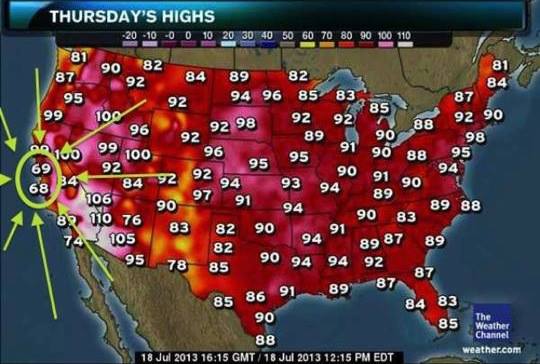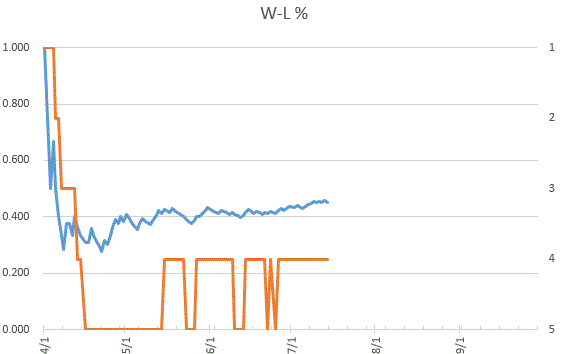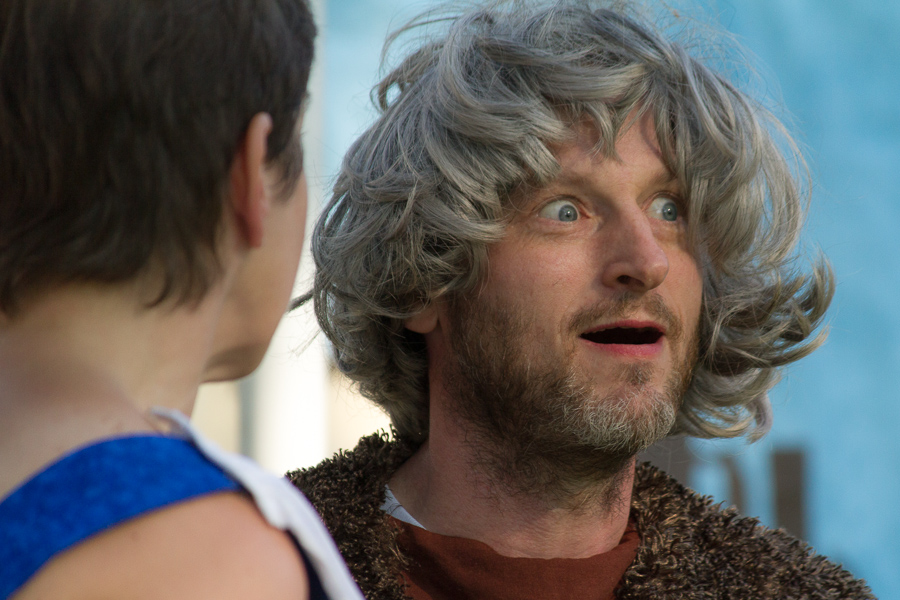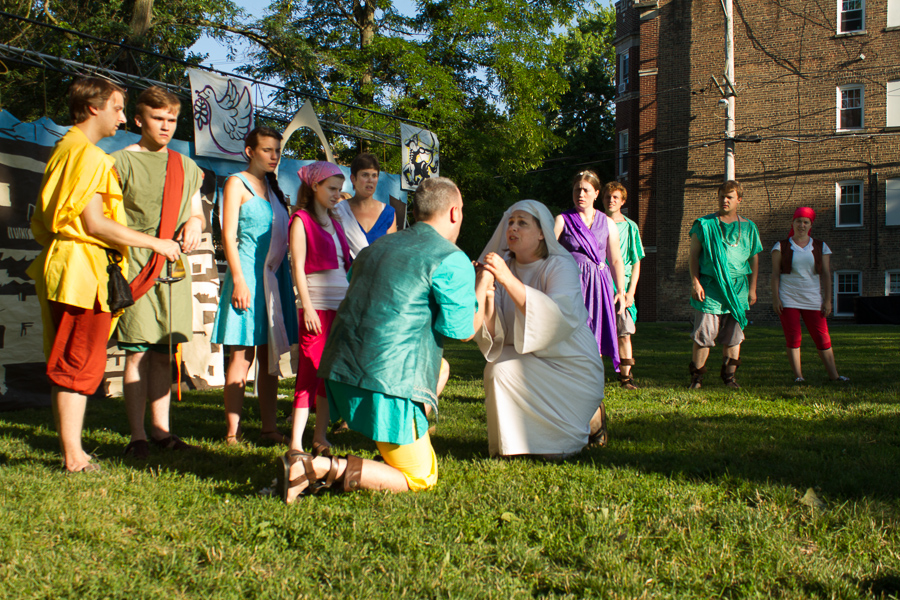Parker and I have walked about 90 minutes today, and we'll probably walk some more half an hour from now. It's 23°C and crystal clear, with a forecast for more of the same all weekend.
I may not get anything done until Monday. Pity.
As forecast yesterday, Chicago's temperatures today haven't even approached normal July levels. Right now O'Hare reports 16°C after a high at noon of just 18°C. That's normal for October 10th; for July 27th, the normal high is 29°C.
As it's unlikely the temperature will rise much due to the cloud cover and stiff wind off the lake, it looks like we've set a new record low maximum, two degrees below the previous record of 21°C.
Great walking and sleeping weather, though.
Remember, last July was the second-hottest on record for us.
I hope this was less of a surprise to the staff at WBEZ, Chicago Public Radio, than to me:
On Friday, longtime CEO and President of Chicago Public Media, the parent of WBEZ resigned to the Board of Directors.
In my years as Chicago Public Media’s CEO, we have shown how digital media married to broadcast technologies can provide a nexus for polycultural discussion and insight, that entertaining experiences crafted with underlying substance can enthrall multi-platform audiences, bringing Chicago Public Media both respect and solid fiscal health.
Malatia, who started at WBEZ in 1993, co-created This American Life with Ira Glass.
After a warm start to the month, Chicago temperatures have fallen a bit:
Saturday temps may not break above 21°C and could flirt with or set a new record low daytime maximum for the date.
Saturday temperatures, which reached the 30s Celsius just a week ago, may struggle this weekend just to reach 20°C. A reading below 20.6°C would set a new record for the lowest maximum on the books for July 27. The previous record this date was set in 1981.
Wednesday I wore a polo and jeans, and shivered on the way home from work. Yesterday I wore a long-sleeve shirt that I rolled up most of the day. Today I'm back in a polo and blowing on my hands to keep warm.
That's the most interesting thing about anthropogenic climate change: even though the planet gets warmer, local weather may be cooler—and more extreme.
Urban planner Pete Saunders, a Detroit native and Chicago resident, doesn't see many similarities between the two cities:
Chicago has a much larger and more diverse economy to draw from to address its debt concerns. A report from the federal Bureau of Economic Analysis released in February shows that Chicago metro area GDP in 2011 was $548 billion annually, making it the third largest in the nation after New York and Los Angeles. That makes the Chicago economy nearly three times larger than Detroit's, which checks in at $199 billion. Chicago's economy is also more diverse than Detroit's, with no one industry sector making up more than 13 percent of the metro area workforce. Chicago's economy also enjoys demonstrated strengths in areas where Detroit is weaker — specifically, finance, transportation and warehousing, and education. There is simply a broader and deeper reservoir that Chicago can tap.
Perhaps more important, there are key historical differences that led Detroit to bankruptcy but kept Chicago on a growth path. Circa 1950, Chicago and Detroit were mid-century manufacturing doppelgangers — economic powerhouses teeming with industrial businesses, each with a bevy of skilled and unskilled workers to employ. However, governance differences caused their paths to diverge. Mayor Richard J. Daley is often remembered as the quintessential machine politician, but he cut his political teeth in fiscal policy before occupying the fifth floor at City Hall. He put that expertise to good use while in office. Also, the dozens of municipal corporations and special-purpose districts here, lacking in Detroit, meant the fiscal burden could be spread around. As a result, City Hall ends up having fewer direct responsibilities and a slightly rosier fiscal picture.
When Detroit doubled down on flinging its population into the suburbs in the last half of the 20th century, Chicago cleaned up. I remember the smog, dirt, and crime of the 1980s vividly—and the stunning clean-up in the 1990s. During the same time, Detroit emptied out even more.
Detroit shows just about ever method available for killing a city; Chicago shows the opposite. Urbs in horto is a reality.
Crain's takes a look at how concealed carry affects private property:
Building owners have the authority to prohibit people from entering their property with a concealed firearm. To exercise this right, building owners “must post a sign . . . indicating that firearms are prohibited on the property.” Signs that say the carrying of firearms is prohibited must be “clearly and conspicuously posted” at the entrance of a building, premises or property where it is prohibited. The Illinois State Police is charged with adopting rules and standards for these signs. Building owners should also consider the implications of posting signs. If they prohibit firearms and then do not enforce the rules, are they opening themselves up to additional liability?
Do landlords want to prohibit the concealed carrying of firearms on their property and in their buildings? If they do, then they should consider what policies to adopt and where to post the signage to prohibit it. Landlords should review their standard lease rules and regulations to ensure that they implement the concealed carry policies. Even though Illinois is the last state to permit concealed carry of firearms, the new law may be a good opportunity to review standard lease provisions in other states.
The author also talks about how the new law affects bars and third-party property managers.
But think about this: in one of the most advanced countries in the world, in the 21st century, we have to put up signs to prohibit armed people from entering. You know, I recognize the necessity of having armed police on the streets. I submit that allowing everyone else to carry guns will make us less safe, both from the guns and from the police response to having more guns around.
Welcome back, 19th Century.
Chicago has experienced its first big heat wave of the year, with temperatures above 32°C every day this week. Yesterday, 46 of the lower 48 states reported temperatures in that range, with only North Dakota and Minnesota spared.
A friend who lives in San Francisco posted this with the caption, "Summer hits the Bay Area:"

It cooled down last night, so it's now just about
26°C...here. Only I'm going to New York in a few hours, where today will not only get to
35°C, but will have violent thunderstorms and buckets of rain. Good weekend to visit.
Anyone who's paid attention to this blog knows I've gone to most of the ballparks in the country, Wrigley Field most often. As much as I love the place, Wrigley's age shows. I mean, poles, for crying out loud.
So, OK, the park needs some freshening, but on the inside. It does not need all this crap.
Yesterday, I and all the other fans of the park lost that fight: the pliant Chicago Plan Commission approved Tom Ricketts' renovation plan after a late-hour capitulation from 44th Ward alderman Tom Tunney:
With a unanimous vote at a hearing this afternoon, the Plan Commission moved the Cubs past one of the final hurdles before the entire project heads to the City Council for a vote, which could be on July 24.
The commission gave the Cubs the green light on construction of a plaza in its adjacent triangle property, a six-story office building and a boutique hotel across the street. The plan includes a pedestrian bridge over Clark Street and a main hotel lobby entrance facing Patterson Street as the team had planned, but the Cubs have "deferred" a planned patio deck over Patterson and hope to revisit the idea at a later date.
We don't need a frickin' Jumbotron. Really. Nor do we need a hotel at Clark and Addison. (And who's going to stay there on the 270 days when the Cubs aren't playing at home?) Oh, and the rooftop owners aren't exactly going to save the day, but their narrow self-interest will at least slow down the destruction:
With the Alderman on their side, the last remaining roadblock to the Cubs' plan could be the Wrigleyville Rooftop Association, which continues to threaten a lawsuit if their views are blocked by outfield signage that was approved last week.
The park has nothing to do with the team sucking like a Dyson; the bad playing does. I have no idea why Tunney is letting this go through or why Ricketts thinks he needs to build this.
Wrigley's biggest draw is its history. Ricketts and Tunney, who have attention spans only slightly longer than Parker's, can't understand this.
Today begins baseball's All-Star break, with the All-Star Game tomorrow in New York and 2/3 of the season behind us in purgatory.
Despite yesterday's 10-6 loss to St. Louis, the Cubs have improbably won 14 of their last 21 games, bringing them nearer .500 than at any point since the fifth game of the season back on April 6th, ending the first half of the season at 42-51 (.452):

So after 93 games, with 69 left to play, the Cubs are in 4th place, 4½ games away from a winning season, but unfortunately 10 full games out of 3rd place. With the Cardinals just ahead of the Pirates as the best team in all of baseball right now, and with both of those teams in our division, we have no hope of anything this year.
Last night was typical Cubs play, though. I went to most of the game, bailing after the 7th with the score 5-4 Cardinals. That became 6-4 Cardinals while I waited for the bus, so I guessed I'd made the right decision.
The Spectralia theater company gave their fifth performance of Comedy of Errors yesterday at Touhy Park, Chicago. Don Johnson's adaptation clocks in at 90 minutes and zips along through Shakespeare's farce of two sets of identical twins who meet for the first time at the end of the play.
Yesterday's Chicago weather could not have been better for the
Mary-Kate Arnold as the Courtezan:

Don Johnson, the adapter, playing Doctor Pinch:

The cast:
